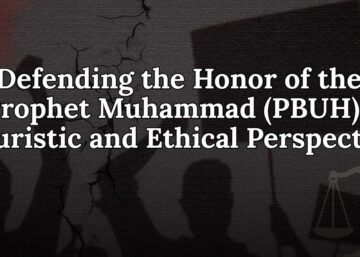Defending the honour of Prophet Muhammad (peace be upon him) is considered a sacred duty for Muslims, rooted in Quranic injunctions and the teachings of the Prophet himself. The Quran emphasizes the importance of respecting and upholding the dignity of the Prophet, as he is the final messenger sent by Allah to guide humanity. Here are several Quranic verses that shed light on our duties in defending the honour of the Prophet:
Surah Al-Ahzab (33:56):
“Indeed, Allah and His angels confer blessings upon the Prophet. O you who have believed, ask [Allah to confer] blessing upon him and ask [Allah to grant him] peace.”
This verse highlights the divine command for believers to send blessings upon Prophet Muhammad (PBUH), expressing reverence and love for him. By invoking blessings upon the Prophet, Muslims demonstrate their commitment to honouring his status as the chosen messenger of Allah.
Surah Al-Ahzab (33:57):
“Indeed, those who abuse Allah and His Messenger – Allah has cursed them in this world and the Hereafter and prepared for them a humiliating punishment.”
The Verse is clearly highlighting and stating that there is no mercy to those who abuse ALLAH and His Holy Prophet Muhammad (PBUH) and severe punishment is announced for them.
Surah Al-Ahzab (33:69):
“O you who have believed, be not like those who abused Moses; then Allah cleared him of what they said. And he, in the sight of Allah, was distinguished.”
Surah Al-Hujurat (49:11):
“O you who have believed, let not a people ridicule [another] people; perhaps they may be better than them; nor let women ridicule [other] women; perhaps they may be better than them. And do not insult one another and do not call each other by [offensive] nicknames. Wretched is the name of disobedience after [one’s] faith. And whoever does not repent – then it is those who are the wrongdoers.”
This verse highlights the imperative of refraining from ridiculing or insulting others. When Allah is refraining such actions made for the common people then we can imagine how much strict punishments be waiting for those who even think to dishonor the Prophet Muhammad (PBUH). The words “perhaps they may be better than them” describes the value accorded to the honor of the Prophet Muhammad (PBUH) because it is an established belief and a proven fact that he is the best person among all mankind.
It emphasizes the significance of maintaining respect and dignity in all interactions, especially concerning matters as sacred as the Prophet’s honor.
We can also see how Allah reacts in the matter Honor of Prophet Muhammad (PBUH). For the spread the message of Islam, Our Holy Prophet (PBUH) decided to travel to the city of Taif, hoping to find a receptive audience among its inhabitants. However, upon reaching Taif and presenting the message of Islam to its leaders, Prophet Muhammad (PBUH) encountered harsh rejection and hostility. The people of Taif not only refused to accept his message but also incited the youth and slaves to pelt him with stones and drive him out of the city. He sought refuge in a nearby orchard, where he supplicated to Allah, seeking solace and strength in the face of rejection and hardship. During this pivotal moment, Angel Jibreel (Gabriel) appeared to Prophet Muhammad (PBUH) with the Angel of the Mountains, offering to crush the people of Taif between the mountains as retribution for their mistreatment. It is clear indication that how ALLAH intended to punish the people of Taif. However, Prophet Muhammad ((PBUH)) responded with compassion and forgiveness, choosing to pray for the guidance of the people of Taif instead of seeking vengeance.
In a Hadith of Anas ibn Malik: Anas reported that the Prophet (PBUH) said, “None of you will have faith till he loves me more than his father, his children, and all mankind.” (Sahih al-Bukhari) This Hadith underscores the deep love and reverence that Muslims should have for Prophet Muhammad (PBUH), which naturally inclines them to defend his honor against any form of disrespect or insult. A Muslim may forgive the disrespect made to our his family but we cannot forgive any similar actions made against the honor of Prophet Muhammad (PBUH).
In summary, the Quran enjoins believers to defend the honour of Prophet Muhammad (PBUH) through actions that reflect reverence, dignity, and respect. Muslims are encouraged to send blessings upon the Prophet Muhammad (PBUH) and uphold the principles of dignity and respect in all interactions. Through these actions, believers demonstrate their unwavering commitment to honouring the noble status of the Prophet Muhammad (PBUH).



